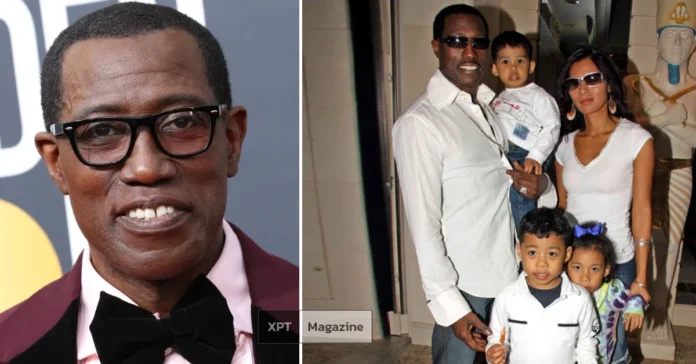Brian Urlacher went from one of the NFL’s most feared linebackers to a full-time dad who values family over fame. His path from small-town Texas to Bears legend proves that real success can happen after the final whistle.
Who Is Brian Urlacher?
Brian Keith Urlacher dominated as a Chicago Bears linebacker for 13 seasons, earning respect as one of football’s most intimidating defenders. At 6’4″, with rare speed and power, Urlacher led Chicago’s defense for over a decade.
But behind the helmet and fierce game-day scowl lives a man whose priorities shifted dramatically after hanging up his cleats. The player who once lived for Sunday showdowns now finds greater joy in everyday moments with his children.
“You focus so much on the next game, the next season,” Urlacher said. “Then one day, you look up and realize your kids are growing fast. Being there for them is what matters.”
Growing Up in Pasco, Texas
Born in 1978, young Brian showed athletic promise in the small community of Pasco. With their father often absent, Urlacher’s mother, Lavoyda, raised the kids on her own. Her grit shaped the discipline that carried him through football.
His high school years showcased his versatility—playing linebacker, safety, and even wide receiver while also excelling in basketball and track. Big programs passed him, which only made him more determined to prove himself.
The University of New Mexico took a chance on Urlacher, initially using him as a safety before moving him to linebacker—a decision that changed football history.
In New Mexico, Urlacher’s athletic gifts blossomed. He played offense, defense, and special teams, returning kicks with unexpected agility for his size. In his senior year, he scored 14 touchdowns and led the team in tackles, numbers rarely seen from a linebacker.
His versatility caught NFL scouts’ attention, transforming him from an unknown prospect into a potential first-round pick.
Draft Day and Rookie Impressions
The Chicago Bears selected Urlacher ninth overall in the 2000 NFL Draft, making him the cornerstone of their defensive rebuild. Chicago fans, nostalgic for the dominant defenses of the 1980s, watched cautiously as the rookie adjusted to professional football.
After a slow start at outside linebacker, the Bears moved him to middle linebacker—his natural position. The change unlocked his potential, resulting in 124 tackles and 8 sacks during his rookie campaign. These impressive numbers earned him NFL Defensive Rookie of the Year honors and the first of many Pro Bowl selections.
How Urlacher Became a Chicago Bears Icon?
Urlacher quickly became the heart of Chicago’s defense, drawing comparisons to Bears linebacker greats like Dick Butkus and Mike Singletary. His unique combination of size and speed revolutionized the middle linebacker position for a new era.
Teammates saw him as a leader who knew the playbook better than anyone and made sure everyone was in position before each snap, and his able to position everyone correctly before each snap. He became a coach on the field, making real-time adjustments that frustrated opposing offenses.
Chicago’s faithful embraced him as the newest defensive icon in a franchise known for legendary defenders. His number 54 jersey became ubiquitous throughout Illinois, symbolizing the Bears’ defensive identity.
Career Highlights: Awards, Stats, and Records
Eight Pro Bowl selections confirmed his place among the NFL’s elite. He earned First-Team All-Pro recognition four times, cementing his status as the premier linebacker of his generation. His crowning individual achievement came in 2005 when he won NFL Defensive Player of the Year after leading the Bears to the league’s top-ranked defense.
His statistical achievements matched the accolades. He finished with over 1,300 tackles, 41.5 sacks, 22 interceptions, and 12 forced fumbles—numbers that rank among the best for his position. More importantly, he helped resurrect Chicago’s defensive reputation.
The 2006 season saw Urlacher lead the Bears to Super Bowl XLI. Though they lost to the Indianapolis Colts, reaching the championship game validated his impact on the franchise.
Adversity on the Field: Injuries & Comebacks
Like any warrior who battles for 13 seasons, Urlacher faced significant injuries. A hamstring tear in 2004 sidelined him for seven games, offering the first glimpse of his mortality. His recovery and return to dominance demonstrated his resilience.
A dislocated wrist in the 2009 season opener ended his year prematurely. Watching from the sidelines proved excruciating for someone accustomed to leading the defense. The following season, he returned with renewed intensity, proving doubters wrong with another Pro Bowl campaign.
These comebacks reinforced his reputation as Chicago’s defensive backbone.
Why Urlacher Retired in 2013?
The 2012 season became Urlacher’s last. Hampered by knee problems and showing signs of age, he still managed to start 12 games. The Bears offered a deal he felt was a lowball. Rather than take it, Urlacher walked away on his terms.
“I can’t imagine myself playing for another team,” he said upon announcing his retirement. “I’m a Bear. I’ll always be a Bear.”
His decision surprised many who believed he had more seasons left. But for Urlacher, the choice reflected both pride and pragmatism—his body had given football everything it could.
Life After Football: Broadcasting, Business, and Fatherhood
Retirement opened new chapters for Urlacher. His football knowledge made him a natural fit for broadcasting, where he provided insights as an analyst for Fox Sports and NFL Network. His no-nonsense style made him a natural on TV.
Business ventures also occupied his time. Investments in real estate and partnerships with Chicago-area businesses built on his local popularity. His entrepreneurial spirit showed the same strategic thinking that made him successful on the field.
But nothing compares to his role as a father. For Urlacher, retirement meant coaching youth sports, attending school events, and making up for time missed during his playing days.
Home Is Where the Heart Is: Marriage & Kids
Urlacher’s family expanded after football. He married Jennipher Frost in 2016, bringing together their blended family. Between them, they share several children from previous relationships, creating a busy household.
His daughter Pamela, from an earlier relationship, was born during his playing days. After retirement, he welcomed son Kennedy with Frost, experiencing fatherhood with a new perspective, one uninterrupted by training camps and road games.
Urlacher fought for custody of his son, Riley, from a previous relationship, showing his commitment to active fatherhood. The courts ultimately granted him custody, allowing him to provide stability and guidance.
Life Now: Family First, Football Second
Post-retirement, Urlacher’s schedule revolves around family rather than football. Mornings begin with school drop-offs instead of team meetings. Afternoons include kids’ practices rather than his own workouts.
He maintains his football connections through charity events and Bears alumni gatherings. His annual youth football camp allows him to mentor young athletes while keeping his competitive spirit alive.
Home life centers on normalcy despite his celebrity status. Family meals, movie nights, and vacation trips fill his calendar—simple pleasures often missed during playing days.
“The best part about retirement is just being present,” Urlacher said in a rare interview about his family life. “During my career, I was physically there but mentally preparing for the next game. Now I’m fully engaged with my kids.”

Urlacher’s football legacy secured him a place in the Pro Football Hall of Fame in 2018. His gold jacket and bronze bust commemorate his on-field achievements, but his life after football offers equally valuable lessons.
His transition from player to parent demonstrates how careers end, but family endures. Where many retired athletes struggle with identity, Urlacher embraced new roles with the same commitment he showed as a player.
He avoids the spotlight now, preferring privacy for his family. This choice reflects his understanding that fame serves little purpose in raising grounded children.
Final Thoughts
Today, Urlacher focuses on raising his children outside the public eye. His occasional appearances at Bears events show his continued connection to the franchise, but his priorities center on home life.
His children now approach the ages where they’ll make their own life choices. Whether they follow athletic paths remains to be seen, but they carry forward the values of hard work and perseverance that their father demonstrated throughout his career.
For the man who once represented Chicago’s defensive toughness, success now means watching his children grow into confident, independent individuals. The fierceness once channeled into tackling running backs now fuels his protection and nurturing of his family.
Brian Urlacher’s biggest win wasn’t on the field. It was knowing when to step away and focus on being a dad, his most important role yet.




